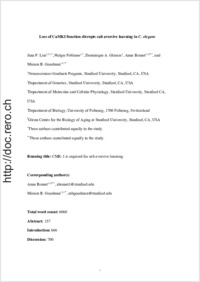Loss of CaMKI function disrupts salt aversive learning in C. elegans
- Lim, Jana P. Neurosciences Graduate Program, Stanford University, Stanford, USA
- Fehlauer, Holger Neurosciences Graduate Program, Stanford University, Stanford, USA
- Glauser, Dominique A. Department of Biology, University of Fribourg, Switzerland
- Brunet, Anne Neurosciences Graduate Program, Stanford University, Stanford, USA
- Goodman, Miriam B. Neurosciences Graduate Program, Stanford University, Stanford, USA
-
14.06.2017
English
The ability to adapt behavior to environmental fluctuations is critical for survival of organisms ranging from invertebrates to mammals. Caenorhabditis elegans can learn to avoid sodium chloride when it is paired with starvation. This behavior is likely advantageous to avoid areas without food. While some genes have been implicated in this salt aversive learning behavior, critical genetic components, and the neural circuit in which they act, remain elusive. Here, we show that the sole worm ortholog of mammalian CaMKI/IV, CMK-1, is essential for salt aversive learning behavior in C. elegans. We find that CMK-1 acts in the primary salt-sensing ASE neurons to regulate this behavior. By characterizing the intracellular calcium dynamics in ASE neurons using microfluidics, we find that loss of cmk-1 leads to an altered pattern of sensory- evoked calcium responses that may underlie salt aversive learning. Our study implicates the conserved CaMKI/CMK-1 as an essential cell-autonomous regulator for behavioral plasticity to environmental salt in C. elegans.
- Faculty
- Faculté des sciences et de médecine
- Department
- Département de Biologie
- Language
-
- English
- Classification
- Biological sciences
- License
-
License undefined
- Identifiers
-
- RERO DOC 305033
- DOI 10.1101/149682
- Persistent URL
- https://folia.unifr.ch/unifr/documents/305994
Statistics
Document views: 107
File downloads:
- pdf: 185
